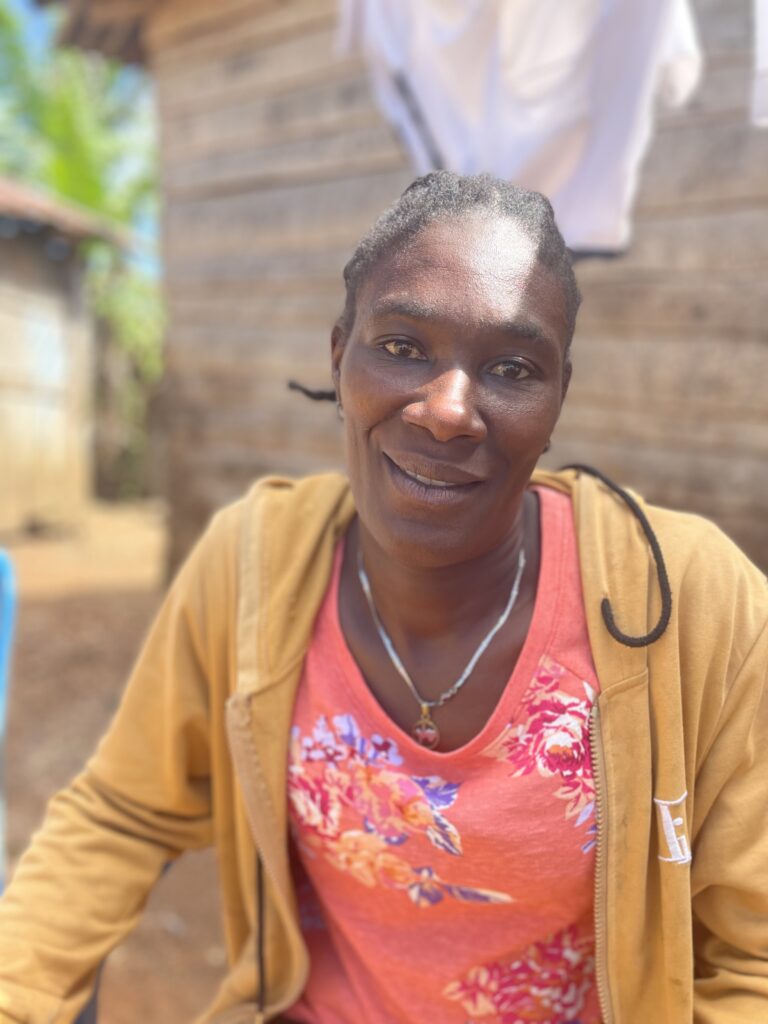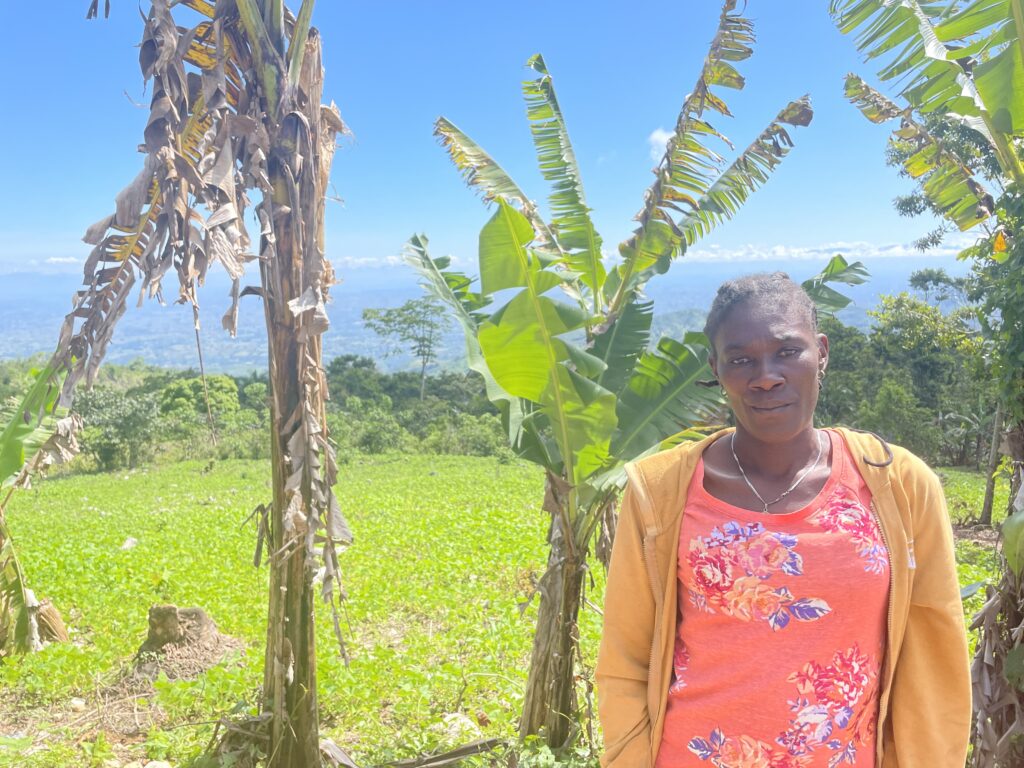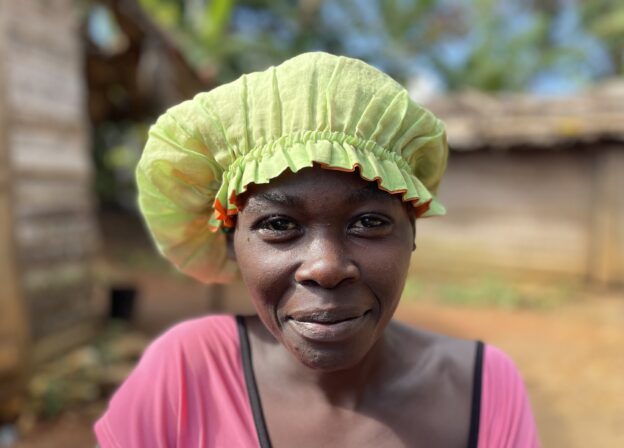Merjina Jean lives in Gwo Moulen, but she isn’t from the area. She’s from Flande, a busy y-shaped intersection that connects the road to Mibalè with the roads to Laskawobas, Beladè and the Dominican border in one direction and with the road to Savanèt in the other. She was living with her mother there when she had a child with a young man from Mibalè. Her mother threw her out of the house. The father’s mother ask her to give her the child to raise, but Merjina couldn’t bear to part with it. “He was the only child I had.”
She drifted for a short time, then she met the father of her second child, her daughter. He was from Gwo Moulen, and he brought her there to live with him. She would stay at home with her two small children, and he would travel back and forth to the Dominican Republic, working odd jobs there, and then coming home with what money he could.
One day, while he was in the D.R., the man’s mother came to tell Merjina that the man wanted her out of the house. The house was on his family’s land, so Merjina felt she had no choice. She had to leave, but she had no place to go. A neighbor finally invited her to move with her two children into a small shack on his land. By then she was part of the CLM program. She was selected while still living with her daughter’s dad.
When it came time to invest in assets to develop, she decided that she wanted livestock. The CLM program used to acquire the assets a member wanted and then transfer them to the member, but the program has been evolving, and it now transfers funds for investment in cash. Members make an investment plan in consultation with their case managers. They discuss the total amount that the program can offer to them, and they work out what different investments they will make. When they are ready to make those purchases, the case manager gives them the cash and follows up to see what they end up buying. Merjina took the money the program made available, and she bought two goats and a pig.
But it appears as though the purchases were not good ones. Her pig withered and then died not long afterwards. She now suspects that it was sick when she bought it, that the seller somehow concealed the pig’s condition. She still has her two goats, but neither has reproduced yet. She probably needs to sell them to buy others. She cannot afford just to hold onto them. The program had a lot of reasons for switching from in-kind transfers to cash ones, but Merjina’s experience shows that it has work to do as far as helping members buy well.
In the meantime, Merjina is now dating another man. She and her new partner are now planning to use Fonkoze’s contribution to home repair to fix a home that belongs to him. Then Merjina plans to move in with her two children.
She’s is pleased to have a partner again, and he seems happy to be able to help Merjina. He thinks, for example, that he can help her buy better goats when she decides to replace the ones she bought herself. And they are already farming together on land that belongs to him. She is not from the area, so she doesn’t have any farmland of her own. A single good bean crop could go a long way towards improving Merjina’s finances.
But there is one problem they will need to work through. Her partner wants them to have a child together as soon as possible. For him, it is a way to cement their relationship. Merjina wants to wait. “I have two children, and I can’t do anything for them yet.” A three-way conversation about this, and the need to make it a subject of serious and honest discussion between the two of them, takes up a large portion of the time their case manager spends with them on the day of our visit.

Clautilde’s life was once very different from the one she leads now. She and her husband were succeeding. Their farming had enabled them to buy land, both for their home and for farming. They also bought a mule to help with chores, but to enable Clautilde to carry merchandise between their home on the ridge east of Gwo Moulen and the market in Laskawobas, too.
But her husband abandoned her and their three children. He went to live with another woman. When she joined CLM, she depended on charity from her family.
She has, however, been working hard and successfully since she became part of the program. She bought three goats with the investment money that Fonkoze made available. Only one had its first litter, but the kid did not survive. Now two of them are pregnant, so she is hopeful.
Her other areas of investment have been more successful. She used some of the funds left over after her purchase of the goats to start a small commerce, and some of them to buy chickens and ducks.
The poultry has been flourishing. She has to keep them locked up in a shed for the moment. They’d do too much damage to the bean fields, which are everywhere in her neighborhood right now.
The commerce was initially made easier because she already had a mule. She buys produce in Gwo Moulen, and brings it for sale in Laskawobas. There, she buys basic groceries: food stuffs like rice, sugar, and oil and laundry products as well. She sells this merchandise both in the market where she buys them and out of her home on the top of the hill.
She has a couple of problems she needs to manage, though. For one thing, her mule hasn’t been well. It has been refusing to climb certain parts of the trail with its load. She’s thinking that she needs to just put it out to pasture so it can regain its health and then sell it to buy another.
For another, she has more money than she would like in the hands of customers who buy on credit. “Things have been really hard, and when your neighbors ask you to sell on credit, it’s hard to say ‘No.'” That’s common enough for merchants that sell basic necessities out of their homes, but Clautilde explains that neighbors will seek her out in Laskawobas, too. They will find themselves in the market with too little money to buy what they need, and they’ll ask for her help. For now, she still has enough merchandise to keep selling, and she feels confident that the folks who owe her money will pay.
She has been making weekly deposits in her savings and loan association, called a VSLA. She has a loan in her hands right now, having borrowed 20,000 gourds — a little over $150 — to both reinforce her business and invest in planting beans. Her first repayment is scheduled for later this month. In July, when the association’s 12-month cycle finishes, she will receive 26,000 gourds of savings along with whatever interest it earned on loans.
The beans she planted are looking healthy. A good harvest will be a significant addition to her income. Between that money and the money she will receive from her VSLA, she has two large projects in mind. She wants to buy a cow, and she’d like to buy more farmland as well.
In the meantime, her ex-husband has been talking to her family, telling them that he wants to come back to her. Her family has asked her to hear him out. “I will listen to what he has to say this once.” But she does not think they’ll get back together. She does not believe he’ll leave the woman he left her for.

